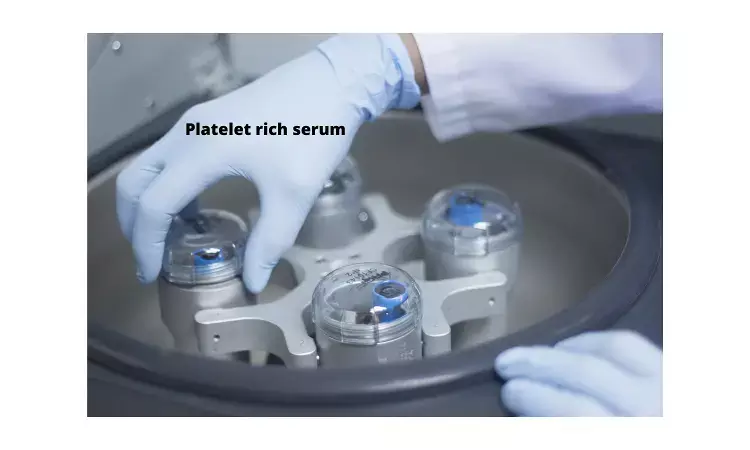- Home
- Medical news & Guidelines
- Anesthesiology
- Cardiology and CTVS
- Critical Care
- Dentistry
- Dermatology
- Diabetes and Endocrinology
- ENT
- Gastroenterology
- Medicine
- Nephrology
- Neurology
- Obstretics-Gynaecology
- Oncology
- Ophthalmology
- Orthopaedics
- Pediatrics-Neonatology
- Psychiatry
- Pulmonology
- Radiology
- Surgery
- Urology
- Laboratory Medicine
- Diet
- Nursing
- Paramedical
- Physiotherapy
- Health news
- Fact Check
- Bone Health Fact Check
- Brain Health Fact Check
- Cancer Related Fact Check
- Child Care Fact Check
- Dental and oral health fact check
- Diabetes and metabolic health fact check
- Diet and Nutrition Fact Check
- Eye and ENT Care Fact Check
- Fitness fact check
- Gut health fact check
- Heart health fact check
- Kidney health fact check
- Medical education fact check
- Men's health fact check
- Respiratory fact check
- Skin and hair care fact check
- Vaccine and Immunization fact check
- Women's health fact check
- AYUSH
- State News
- Andaman and Nicobar Islands
- Andhra Pradesh
- Arunachal Pradesh
- Assam
- Bihar
- Chandigarh
- Chattisgarh
- Dadra and Nagar Haveli
- Daman and Diu
- Delhi
- Goa
- Gujarat
- Haryana
- Himachal Pradesh
- Jammu & Kashmir
- Jharkhand
- Karnataka
- Kerala
- Ladakh
- Lakshadweep
- Madhya Pradesh
- Maharashtra
- Manipur
- Meghalaya
- Mizoram
- Nagaland
- Odisha
- Puducherry
- Punjab
- Rajasthan
- Sikkim
- Tamil Nadu
- Telangana
- Tripura
- Uttar Pradesh
- Uttrakhand
- West Bengal
- Medical Education
- Industry
Platelet rich plasma may improve recovery in Pilonial Sinus patients

Pilonial Sinus (PS) isn't a serious health issue until its infected and causes pain or inflammation however its surgical management has been challenging over years. Complications after the surgical treatment of PS are pain, loss of productive work hours and wound infections taking longer time to heal.
A randomized trial by Can Yahya Boztug and team revealed that in treatment of Pilonial Sinus disease, platelet-rich plasma (PRP) application improved postoperative recovery speed in patient's return to daily activities, reduced their pain scores and increased their quality of life.
The findings of the study are published in BMC Surgery.
The objective of the study was to evaluate the impact of autologous platelet-rich plasma (PRP) with that of minimally invasive techniques in terms of pain reduction, return to daily activities, quality of life, and duration of wound healing after open excision and secondary closure.
The study was a prospective, randomized controlled trial patients with PS disease were enrolled between March 2018 and January 2019 and randomly divided into three groups. Open surgery and moist dressings were applied to patients in group A. Open surgery followed by PRP application was performed on patients in group B. Group C underwent curettage of the sinus cavity followed by application of PRP. Patients completed questionnaires before and after surgery. Demographics, preoperative characteristics, healing parameters, and quality-of-life scores were evaluated and calculated before and after surgery.
The results of the study were
• The cavity volume and wound-healing time were compared among the groups on postoperative days 0, 2, 3, 4, and 21.
• Each patient was followed up throughout the process of wound healing, group C received shorter healing times and smaller cavity volume than the other groups.
• In contrast, the recovery time per unit of cavity volume was significantly faster in group B than in the other groups.
• Overall postoperative pain scores were significantly lower for both PRP groups B and C than for group A (p < 0.001) and showed different time courses among the groups.
Boztug and team concluded that "In the treatment of PS disease, PRP application improves postoperative recovery in that it speeds patient's return to daily activities, reduces their pain scores and increases their quality of life."
Reference:
Boztug, C.Y., Karaagac Akyol, T., Benlice, C. et al. Platelet-rich plasma treatment improves postoperative recovery in patients with pilonidal sinus disease: a randomized controlled clinical trial. BMC Surg 21, 373 (2021). https://doi.org/10.1186/s12893-021-01370-5
Medical Dialogues consists of a team of passionate medical/scientific writers, led by doctors and healthcare researchers. Our team efforts to bring you updated and timely news about the important happenings of the medical and healthcare sector. Our editorial team can be reached at editorial@medicaldialogues.in.
Dr Kamal Kant Kohli-MBBS, DTCD- a chest specialist with more than 30 years of practice and a flair for writing clinical articles, Dr Kamal Kant Kohli joined Medical Dialogues as a Chief Editor of Medical News. Besides writing articles, as an editor, he proofreads and verifies all the medical content published on Medical Dialogues including those coming from journals, studies,medical conferences,guidelines etc. Email: drkohli@medicaldialogues.in. Contact no. 011-43720751


